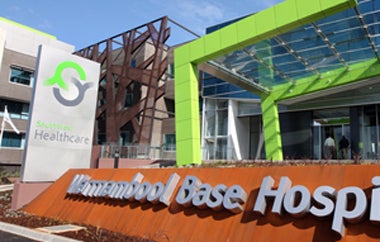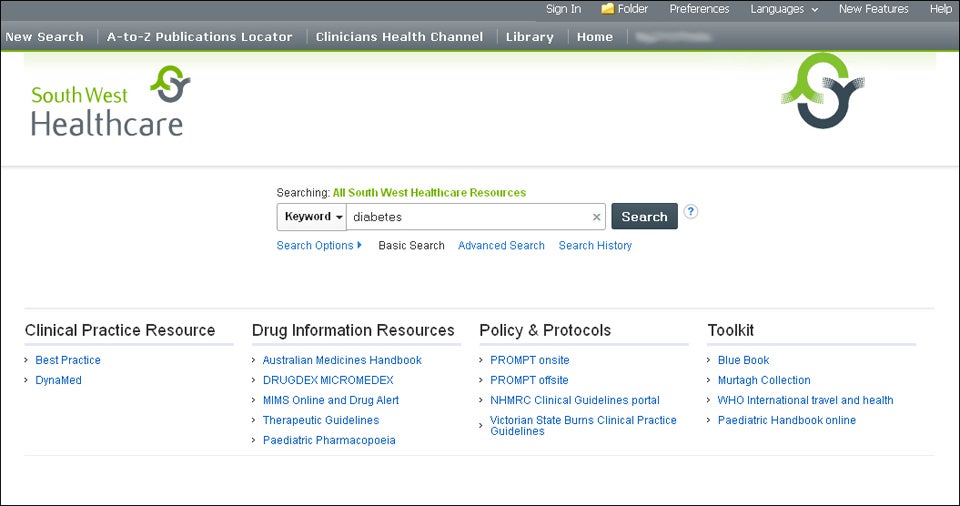
Overview
Headquartered at Warrnambool Base Hospital, South West Healthcare provides medical, nursing, mental health, allied health, and community health services to more than 100,000 residents of southwestern Victoria, Australia. In 2012, the South West Healthcare medical library joined a local collection integration program subsidized by the Victorian Department of Health and powered by EDS Discovery Health. This program enabled the library to customize a unique EDS profile and integrate its local catalogue holdings with the Department of Health’s electronic resources. Now, the South West Healthcare library offers a one-stop shop where health care professionals can quickly access the most up-to-date clinical information.
EDS has helped us streamline the library service process.
EDS has helped us streamline the library service process.
Challenges
South West Healthcare’s Stan Carroll Library owns approximately 6,000 items in its print and electronic collections. The library’s print collections include a patient reference collection, a journal collection, and hospital archives. When Medical Librarian Josella Chan began her position in 2011, the library did not have an efficient library management system. Library users were unable to search the catalogue and check out items online; instead, they relied on the reference desk to locate an item and the traditional card system for borrowing.
“Our library service was not sustainable and was not keeping up with the times,” said Chan, adding that the increasing information demands of expert clinical researchers—including medical students—could not be met by the traditional library OPAC. “We needed to introduce new technologies to improve our resource management and our users’ search experience.”
Furthermore, in critical care situations, practitioners are expected to make clinical decisions within 90 seconds. The absence of a single search interface hindered their ability to find information quickly.
“They were frustrated with going to different websites to access the information,” Chan said. One of those sites is the Clinicians Health Channel, a free clinical information portal subsidized by the Victorian Department of Health and available to all public health workers in the state. The site provides access to journals, databases, and evidence-based resources to help clinicians make informed decisions at the point-of-care.
“We looked for a product that would integrate all of our resources into one single website and allow us to design the user interface from a clinician’s perspective,” Chan said.
Solutions
After evaluating several discovery products, South West Healthcare’s Library Advisory and Support Group ultimately selected EDS for its easy-to-use interface, its vendor-neutral relevancy ranking feature, and its affordability. In addition, South West Healthcare already had a good relationship with EBSCO because the library uses the company’s subscription resources, and the Clinicians Health Channel is powered by EDS.
Although she had only a small budget to work with, Chan was able to implement the changes needed to make way for EDS. First, the library migrated its print collections and lending service to Koha, an open-source library management system. Next, the library joined the Department of Health’s local collection integration program, which enables member sites to customize a unique EDS profile that integrates their library catalogue holdings with the Clinicians Health Channel’s resources.
South West Healthcare’s EDS implementation began in July 2013. Chan noted that EBSCO worked well with Koha and the library’s other service providers and responded quickly to her technical inquiries. “We do not have the information technology departments or experts that universities do,” Chan said. “EBSCO provides good technical support and customer service.”
Branding & Customization
Chan took advantage of several customization and branding options to create a unique EDS interface that would best serve clinical staff and medical students. Branded with the organization’s colors and logos, the EDS home page features a single search box that simultaneously sifts through South West Healthcare’s catalogue holdings and Clinicians Health Channel content. The bottom section organizes links to clinical resources, drug information resources, and policy portals identified by hospital clinicians and teaching staff as the most important.
On the search results page, users can limit their results using facets in the left-hand column. On the right, widgets display links to DynaMed, EBSCO’s point-of-care clinical reference tool, and other non-EBSCO medical databases. After conducting several test searches, Chan noted that the most relevant records appear at the top of the search results list, regardless of vendor.

Promotion & Training
South West Healthcare officially launched EDS in November of 2013. To promote the new tool, Chan emailed an EDS fact sheet to all South West Healthcare’s clinical staff and verbally spread the word. She also emailed the administration at nearby Deakin University Medical School and asked them to alert medical students. Chan presented EDS to general practicioners at a lunch meeting, and created an informational YouTube video, which she posted to the library website and the staff e-learning website.
Training has been both formal and informal. Chan has provided individual and group training sessions to staff. “Most have said [EDS] is easy to use.”
Benefits & Results
Since launching EDS, Chan said she’s seen a “tremendous” increase in library use. Full-text downloads have increased by 170 percent, and abstract downloads have gone up almost 286 percent. “These are incredible results,” Chan said, adding that more users have requested remote access to the library’s information resources.
Document delivery and Inter-Library Loan requests have also risen. When full text is not available, users can complete an Inter-Library Loan Request Form and submit it right from EDS. “EDS has helped us streamline the library service process,” Chan said.
Another key benefit, Chan said, is that medical students coming from universities that offer discovery services can now transfer the search skills they learned as students to the work environment.
“We help them to search information in a similar environment that allows them to transfer their skills to the work environment smoothly and save their time and keep up their skills.” Chan said. “It helps them to improve their efficiency in a clinical environment and helps them make fast decisions in their clinical practice at the point-of-care.”
To learn more about EBSCO Discovery Health, or to request a free trial, click here.